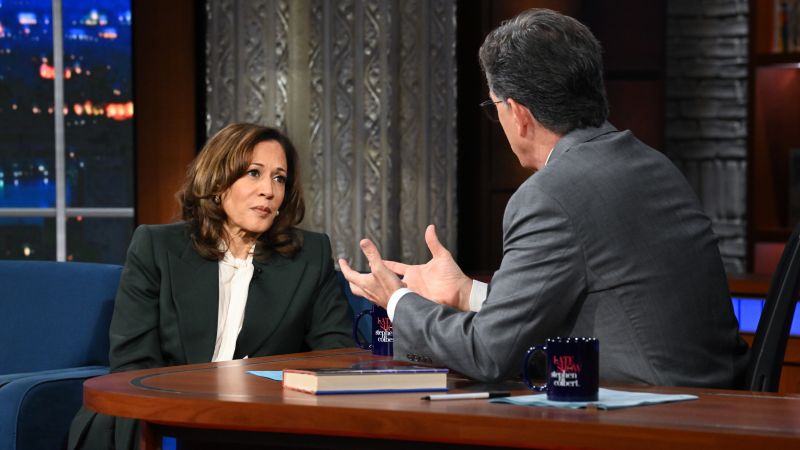In a candid interview with Stephen Colbert on “The Late Show,” former Vice President Kamala Harris shared her thoughts regarding her decision not to run for public office amid concerns about the state of democracy in the United States. Harris, who previously campaigned for the presidency in 2024, expressed deep dissatisfaction with the current political system, describing it as “broken.” This sentiment was particularly evident when she reflected on her consideration to run for governor in California—a position where she was seen as a prominent candidate—with the conclusion that her leadership would not take place within the confines of elected office.
Harris articulated her long-held belief that activism should be pursued from both an external and internal perspective, stating, “When I was young, I thought that people who want to improve or change a system should not just do so from the outside but also change it from the inside.” However, she admitted that, following her experiences in public office, she feels a need to step back. “For now, I don’t want to go back into the system. I want to travel the country. I want to listen to people. I want to talk with people,” she remarked, emphasizing a desire to engage with Americans in a non-transactional manner, indicating that she does not wish to simply solicit votes from citizens.
This profound reflection comes in the context of comments Harris made earlier in the week concerning her non-participation in the upcoming gubernatorial race in California. During her discussion with Colbert, Harris acknowledged having spent significant time contemplating this potential run before ultimately deciding against it. This decision appears influenced by her observations regarding the political landscape and what she perceives as a collective “capitulation” within a system meant to safeguard democracy.
Harris candidly addressed her concerns regarding Donald Trump’s actions during his second presidency, particularly the cuts to Medicaid and the targeting of political adversaries. “What I did not predict was the capitulation,” she stated, explaining how disheartening it has been to see so many individuals, whom she once regarded as defenders of democratic processes, succumb to complacency. This sentiment was echoed when she suggested that many people might believe they are simply “riding out the storm,” which she critiqued as an excuse to avoid active engagement in the political fray.
A noteworthy point in Harris’s discussion was her critique of Congress for its failure to counteract Trump’s proposals, such as the downsizing of the Department of Education. Expressing frustration, she observed that members of Congress appeared inactive, merely “sitting on their hands” during critical moments. In her forthcoming book titled “107 Days,” set to be released in September, Harris will discuss her campaign experiences, highlighting the limited time she faced after Joe Biden withdrew from the presidential race. “I was so conscious and aware of the short time that we had,” she said, revealing the pressures she navigated during that period.
Looking ahead, Harris emphasized the importance of energizing those feeling despondent and fearful regarding current political dynamics. “It is important, I think, that in this moment, where people have become so deflated… those of us who have the ability… to be out there and talk with folks and remind them of their power,” she urged, intimating a commitment to galvanizing activism from outside formal governmental roles. When pressed to identify a leader within the Democratic Party, Harris refrained from naming an individual, suggesting that it is vital for the collective movement to share the responsibility and not default to any single figure.
In sum, Kamala Harris’s reflections reveal a complex interplay of disappointment with the political establishment and a renewed commitment to grassroots engagement during tumultuous times. Her decision not to run for office at this juncture reflects both personal reflections and a broader analysis of the political landscape, highlighting the need for collective action amidst a perceived weakening of democratic governance.











